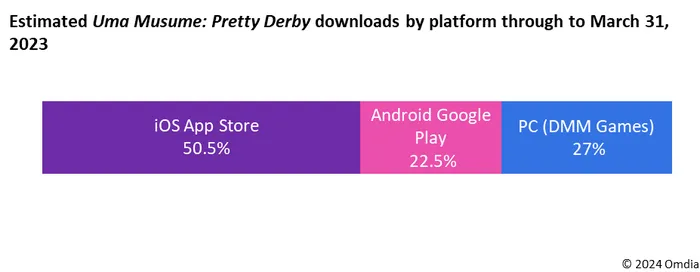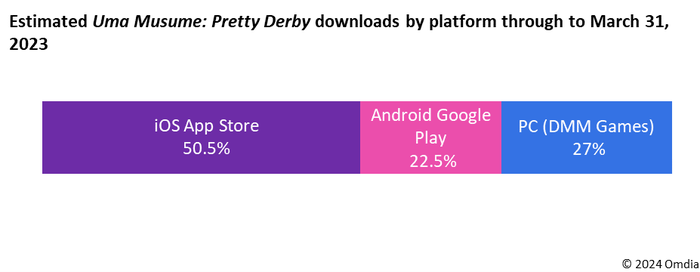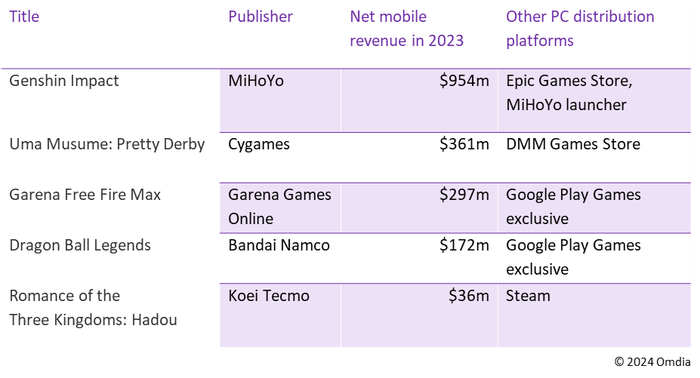
Summary
Google Play Games on PC is a service that allows Android game players to discover or pick up their favorite mobile games on Windows PCs. It is a defense strategy against competing storefronts that host PC ports of mobile games, ensuring Google continues to capture revenue from users who abandon mobile to play on PC.
PC versions of mobile-native core games have historical precedent
Google Play Games on PC lets players pick up their Android gaming sessions on PC. Developers can utilize the program to publish their existing Android mobile games on Windows, and over 3,000 games have been ported to the service, which is still in beta status.
Google Play Games works by simulating the Android software environment on PC, supporting the same payment and gaming-focused features that are already offered on Android via Google Play Services. Developers must instead optimize their games for PC; services that no longer make sense (such as GPS functionality) must be removed, while PC-specific functionality should be included (such as keyboard and mouse support).
Developers are also highly encouraged to enable seamless switching between the mobile version of a game on Android and the version published to Google Play Games on PC. This is where the service’s potential lies as mobile gaming markets with a strong affinity for core games, such as Japan, are where the company already faces stiff competition from competing storefronts that host PC versions of mobile-native games.
Publishers of many top-earning mobile titles in Japan have long been releasing bespoke PC versions of key titles away from Google Play. Genshin Impact is available via the Epic Games Store; Koei Tecmo’s top three performing mobile titles in net revenue terms are available on Steam; while Heaven Burns Red, a hit game from Gree, has been in Steam’s top 100 revenue charts each week since its August 2022 release.
Cygames is one such publisher, having released card battler Shadowverse on PC via Steam back in 2016. Its latest hit title, Uma Musume: Pretty Derby, released on PC via the DMM Games store, and Omdia’s Mobile Games Report – 2023 reveals that downloads for this PC platform made up over a quarter of the total (see Figure 1). This suggests a not insignificant number of core mobile games players play across both mobile and PC.
Figure 1: Over a quarter of downloads for Uma Musume: Pretty Derby were via the DMM Games store

Source: Omdia, Sensor Tower, CyberAgent
Where does Google Play Games fit into all of this? It is a defense strategy against these competing PC storefronts that are capturing mobile gamers’ attention and revenue away from Google Play. But iOS users aren’t necessarily being left out, either.
Google also stands to capture iOS user revenues via PC
It should come as no surprise, then, that Google has been aggressive at courting top-performing core games in the territory for its PC offering, including the aforementioned Uma Musume: Pretty Derby, which launched on the service in April 2023 (see Figure 2).
Figure 2: Select top-performing core titles in Japan ported to PC via Google Play Games

Source: Omdia, Sensor Tower
What makes these PC ports to alternative distribution platforms feasible for publishers to support is the allowance of mobile-platform agnostic logins to sync player progress between mobile and PC. This is a smart move. On mobile, Android faces stiff competition with iOS in Japan, with Omdia’s Connected Devices Database estimating iPhone’s share at 66%.
By opening its PC platform in the same way competing distributors have, it and publishing partners will have access to the large and affluent iOS audience that Omdia estimates of Sensor Tower data suggest contributes almost two-thirds of Japan’s core games’ net revenue in 2023 (see Figure 3).
The reduced friction involved in bringing games to PC – Google Play Services are already supported, for instance – should also tempt publishers into releasing on PC via Google Play Games, rather than a competing distribution platform such as Steam.
Figure 3: iOS’s dominance in Japan will not weaken third-party PC distribution platform’s appeal

Source: Omdia, Sensor Tower
The wide scope of Google Play Games on PC may limit Google’s ability to engage a wider audience beyond Android players. While many core live service games offer platform-agnostic progression, many of the available titles do not have this interoperability. This impedes its ability to establish itself as the preferred place to pick up a mobile game session via PC.
Google also faces competition from publisher-owned distribution platforms that don’t need to depend on it for visibility on PC. For instance, Honkai Star Rail is notably absent from the platform despite Genshin Impact’s availability.
If Google Play Games on PC retains those Android users migrating their mobile gaming to its PC platform rather than competitors’, it will be considered a success. Longer term, while it has an opportunity to engage a mobile audience beyond Android, it is clear many challenges remain.
Appendix
Further reading
Mobile Games Report – 2023 (February 2024)
Mobile Games Title Performance Database – Spotlight (January 2024)
Smartphone Model Market Tracker (November 2023)
Author
James McWhirter, Senior Analyst, Games
Citation Policy
Request external citation and usage of Omdia research and data via [email protected].
Omdia Consulting
We hope that this analysis will help you make informed and imaginative business decisions. If you have further requirements, Omdia’s consulting team may be able to help you. For more information about Omdia’s consulting capabilities, please contact us directly at [email protected].
Copyright notice and disclaimer
The Omdia research, data and information referenced herein (the “Omdia Materials”) are the copyrighted property of Informa Tech and its subsidiaries or affiliates (together “Informa Tech”) or its third party data providers and represent data, research, opinions, or viewpoints published by Informa Tech, and are not representations of fact.
The Omdia Materials reflect information and opinions from the original publication date and not from the date of this document. The information and opinions expressed in the Omdia Materials are subject to change without notice and Informa Tech does not have any duty or responsibility to update the Omdia Materials or this publication as a result.
Omdia Materials are delivered on an “as-is” and “as-available” basis. No representation or warranty, express or implied, is made as to the fairness, accuracy, completeness, or correctness of the information, opinions, and conclusions contained in Omdia Materials.
To the maximum extent permitted by law, Informa Tech and its affiliates, officers, directors, employees, agents, and third party data providers disclaim any liability (including, without limitation, any liability arising from fault or negligence) as to the accuracy or completeness or use of the Omdia Materials. Informa Tech will not, under any circumstance whatsoever, be liable for any trading, investment, commercial, or other decisions based on or made in reliance of the Omdia Materials.






